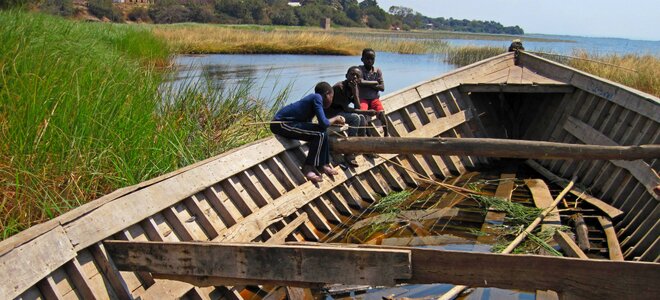World Malaria Day 2025 - Time for strengthened international collaboration
Today is World Malaria Day. Even though malaria control has made great progress and prevented an estimated 2.2 billion cases and 12.7 million deaths since 2000, the disease remains a global health problem: malaria causes major economic costs and over half a million deaths every year. Children under the age of five and pregnant women are particularly affected.
Half a million deaths are preventable: It’s time to strengthen international collaboration

Despite advances, malaria continues to be a major global health challenge, with 597 000 lives lost in 2023 alone. Children under the age of five and pregnant women are particularly affected. (Photo: Andre Laas for SMG)
‘Malaria is preventable and treatable’
To prevent this, increased global cooperation is needed. Fragile health systems, increasing resistance to drugs and insecticides and the effects of climate change threaten the progress that has been made. Successful malaria control requires innovation for new control measures and strategies as well as solid and sustainable investments. According to the latest WHO World Malaria Report, 4.3 billion US dollars will be needed by 2023 to get malaria control back on track and achieve the 2030 targets. This money would be well invested: A 90% reduction in malaria cases by 2030 could increase the gross domestic product in malaria-affected countries by 142.7 billion US dollars. This is why the motto of World Malaria Day is: ‘Reinvest, Reimagine, Reignite’.
„Malaria is preventable and treatable. Fighting malaria is not only an ethical imperative — it is a smart investment in a healthier, fairer, safer, and more prosperous future for all. To achieve this, we must rally increased global cooperation and forge stronger partnerships across sectors.”
Dr. Michael Adekunle Charles,
CEO, RBM Partnership to End Malaria
Austerity programmes are putting progress at risk
However, the opposite is currently happening: the massive cuts in the areas of global health, research, science and innovation by numerous governments - including Switzerland - are exacerbating an already critical situation: around a quarter of funding in global health is being cut worldwide. Health programmes, research projects - and ultimately human lives - are at stake: in 2023, the global number of deaths from malaria was 597,000 compared to 578,000 in 2015.
„Swiss innovations and investments have contributed to successes in malaria control and elimination over decades. As a result, effective and sustainable programmes have been established in malaria-endemic countries, saving countless lives. We must build on these successes to finally achieve the goal of global malaria eradication.”
Prof. Dr. Manuel Hetzel,
Präsident der Swiss Malaria Group
Swiss organisations and research institutes also affected
Switzerland is an important player in the field of global health: it is home to global pharmaceutical companies, leading international organisations such as the World Health Organization (WHO), and renowned research institutes such as Swiss TPH and aid organisations, which are committed to health worldwide. Both the international Geneva as well as research and cooperation projects are jeopardised by international and national cutbacks in global health. As a small country, Switzerland cannot compensate for the funding gaps. However, it is important that Switzerland lives up to its special position in the field of global health and continues to invest in research, innovation and global cooperation.
With this in mind, the Swiss Malaria Group (SMG) and the Alliance against Neglected Tropical Diseases (SANTD) are inviting parliamentarians to a study trip to member organisations of the SMG and SANTD in Basel. The visit to Swiss TPH and Novartis offers insights into cutting-edge Swiss research, commitment and innovation at the interface between business and global health.
About the Swiss Malaria Group
The Swiss Malaria Group brings together research institutions, public institutions, private sector and civil society to effectively fight against malaria. The common goal is to retain and strengthen Swiss commitment in the fight against malaria.


